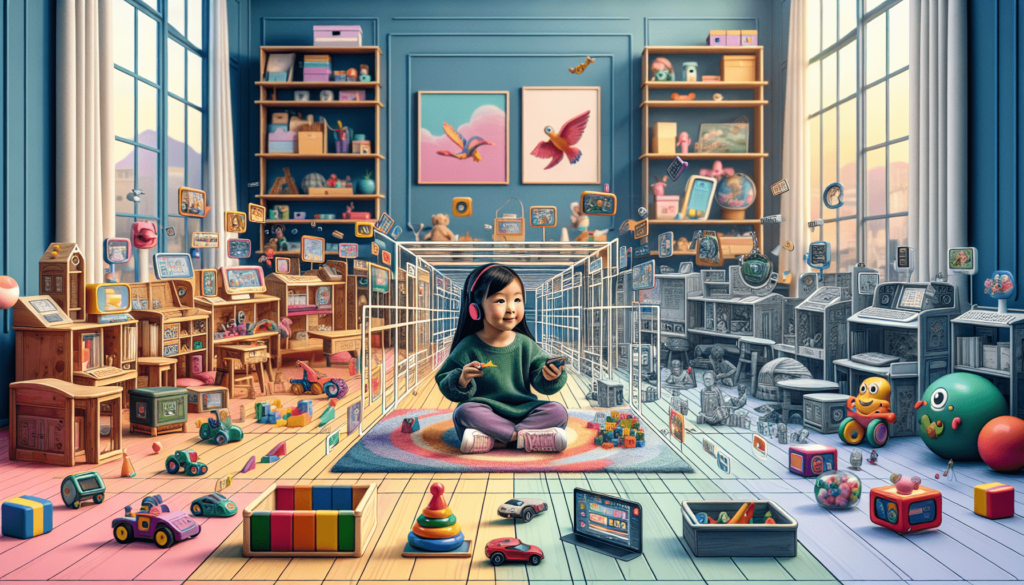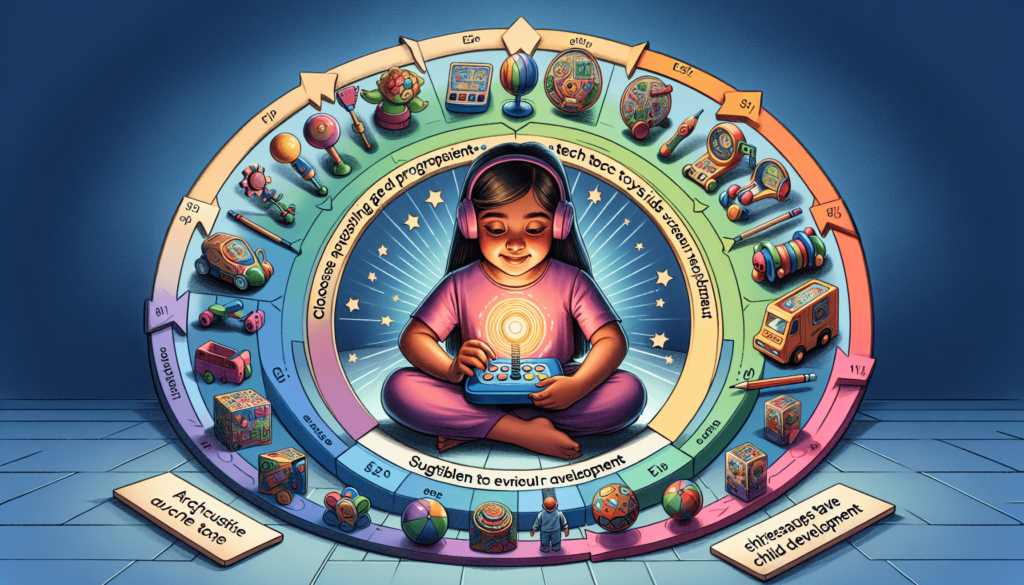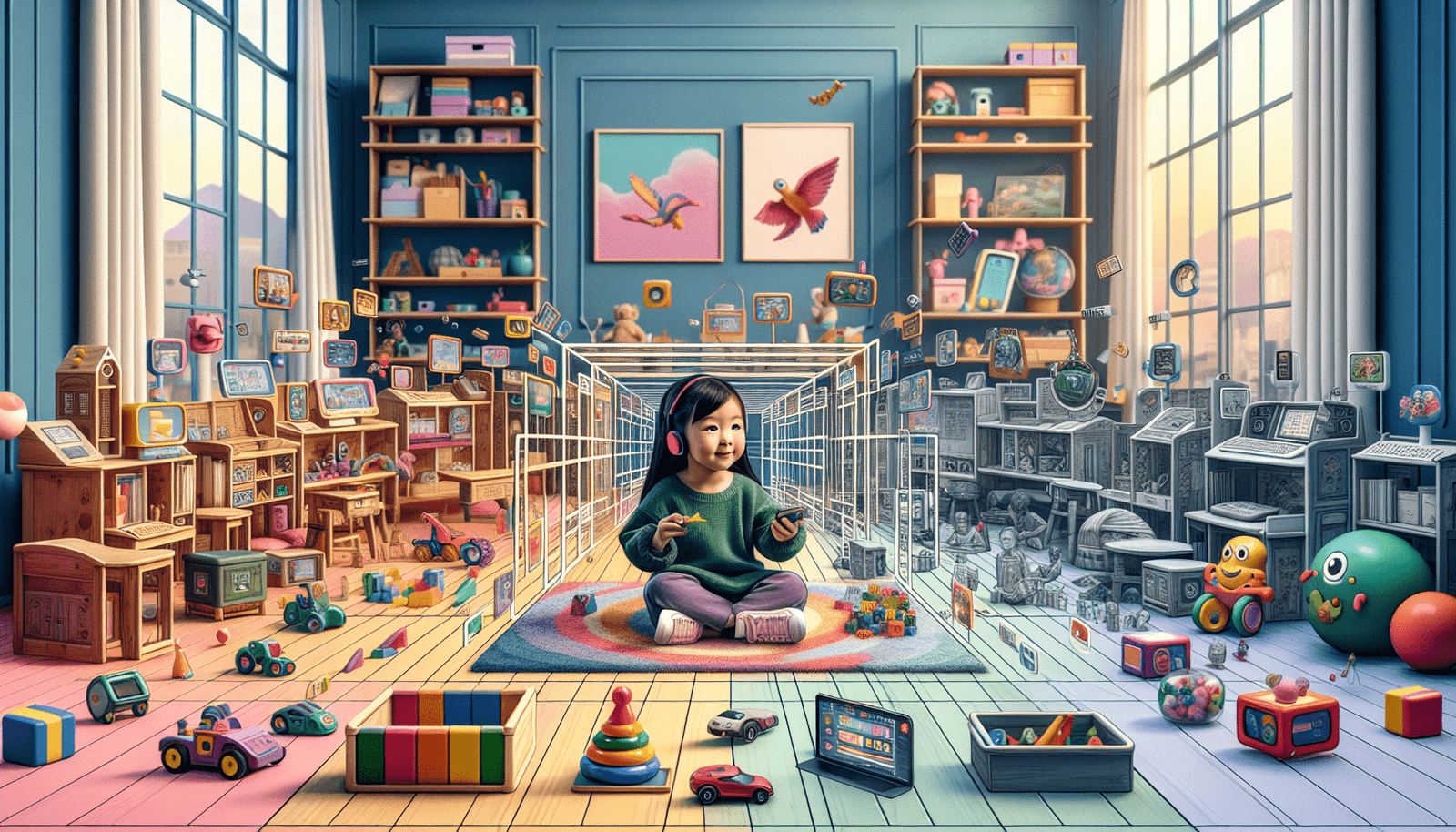Are you looking to find the perfect educational tech toys for your child? In this article, we will guide you through the process of choosing the right toys for different developmental stages. From infants to older children, we will explore the options available and provide you with valuable insights on how these toys can enhance their learning experience. Get ready to discover a world of fun and educational possibilities that will help your child grow and develop their skills.

Top Educational Tech Toys for Different Developmental Stages
Infants (0-12 months)
During the first year of life, infants are rapidly developing their physical and cognitive abilities. They are learning to reach and grasp objects, exploring their surroundings, and beginning to understand cause and effect. Tech toys for infants should focus on promoting sensory development, such as toys with different textures, sounds, and lights. Interactive toys that respond to a baby’s actions can also be beneficial for their early cognitive development.
- Musical mobiles with different textures and sounds to promote sensory development
- Interactive plush toys that respond to a baby’s touch and introduce cause and effect
- Light-up shapes or balls that help develop visual tracking skills
Toddlers (1-3 years)
Toddlers are becoming more mobile and independent during this stage. They are learning to walk, climb, and explore their environment with increasing curiosity. Tech toys for toddlers should focus on encouraging their physical development and fine motor skills. Toys that promote imaginative play and problem-solving can also be beneficial at this stage. Look for toys that allow toddlers to practice skills like stacking, sorting, and building.
- Building blocks with different shapes and colors to enhance fine motor skills and creativity
- Interactive learning tablets or touch-and-learn books that introduce letters, numbers, and basic vocabulary
- Musical instruments and toys that encourage exploration and creative expression
Preschoolers (3-5 years)
Preschoolers are starting to develop more complex cognitive and social skills. They are learning to follow instructions, engage in pretend play, and interact with others. Tech toys for preschoolers should focus on promoting their creativity, problem-solving abilities, and social skills. Toys that encourage imaginative play, storytelling, and cooperative play can be ideal for this age group. Look for tech toys that involve multiple players and provide opportunities for interaction and collaboration.
- Coding robots that introduce basic programming concepts through play
- Art and craft sets that promote creativity and fine motor skills
- Interactive educational games and apps that focus on early math, reading, and problem-solving
Early Elementary (5-8 years)
Early elementary-aged children are continuing to expand their knowledge and skills. They are developing their reading, writing, and math abilities, as well as their critical thinking and problem-solving skills. Tech toys for this age group should focus on further developing their academic skills while still being engaging and fun. Look for toys that incorporate educational content, such as spelling games, math challenges, and science experiments. Interactive toys that promote creativity and exploration can also be beneficial at this stage.
- STEM kits that allow children to build and experiment with circuits, robots, and other scientific concepts
- Language learning apps or software that support reading, writing, and vocabulary development
- Interactive science experiment kits that encourage hands-on learning and critical thinking
Upper Elementary (8-11 years)
Children in the upper elementary stage are becoming more independent and self-directed in their learning. They are developing their research and information-seeking skills, as well as their ability to think critically and solve complex problems. Tech toys for this age group should focus on providing opportunities for hands-on learning and problem-solving. Look for toys that engage children in STEM (science, technology, engineering, and math) concepts, such as coding robots, building kits, and science experiment sets.
- Coding kits that teach children how to code and program their own games, animations, and websites
- Engineering and building sets that promote problem-solving and critical thinking skills
- Virtual reality experiences that provide immersive educational content in various subjects
Pre-Teens (11-13 years)
Pre-teens are going through significant physical and emotional changes during this stage. They are becoming more interested in their peers and developing their own identities. Tech toys for pre-teens should focus on promoting their creativity, critical thinking, and social skills. Look for toys that allow them to express themselves, such as video editing software, art and music tools, and storytelling apps. Tech toys that encourage collaboration and teamwork can also be beneficial at this stage.
- Video editing software or apps that unleash creativity and storytelling skills
- Science kits that involve more complex experiments and introduce advanced scientific concepts
- Cooperative board games or online multiplayer games that promote teamwork and communication skills
Teenagers (13-18 years)
Teenagers are developing their independence and preparing for adulthood during this stage. They are exploring their interests, career aspirations, and personal values. Tech toys for teenagers should focus on providing opportunities for self-expression, skill-building, and career exploration. Look for toys that allow them to explore their interests in depth, such as coding kits, virtual reality experiences, and career simulation games. Tech toys that encourage critical thinking, problem-solving, and decision-making can also be beneficial for teenagers.
- Programming and robotics kits that allow teenagers to build and program their own robots
- Virtual reality simulations that provide career exploration opportunities in various professions
- Financial management apps or software that teach teenagers about budgeting, saving, and investing
Young Adults (18+ years)
Young adults are transitioning into adulthood and making important life decisions during this stage. They are pursuing higher education, career paths, and personal relationships. Educational tech toys for young adults should focus on supporting their academic and professional growth. Look for toys that provide opportunities for skill-building and career development, such as language learning apps, financial planning tools, and professional development courses. Tech toys that promote self-reflection, goal-setting, and personal growth can also be beneficial at this stage.
- Language learning apps or online courses to enhance communication skills and cultural understanding
- Professional development courses or online platforms that provide career-focused skills and knowledge
- Mindfulness and meditation apps or tools that promote stress management and well-being

Considerations for Choosing Educational Tech Toys
When choosing educational tech toys for children at different developmental stages, there are several considerations to keep in mind. These factors can help ensure that the toys you choose are safe, engaging, and beneficial for your child’s growth and development.
Safety
Safety should always be a top priority when choosing any type of toy for children. Make sure to look for educational tech toys that meet safety regulations and have passed any necessary certifications. Avoid toys with small parts that could be a choking hazard, and ensure that the materials used are non-toxic and durable.
Engagement
Engagement is essential to keep children interested and motivated to learn. Look for tech toys that are interactive, responsive, and provide various levels of challenge. Consider choosing toys that incorporate gamification elements, such as rewards and progress tracking, to keep children engaged and motivated to continue learning.
Educational Value
The primary purpose of educational tech toys is to support children’s learning and development. Look for toys that align with the educational goals you have for your child. Consider the skills and knowledge you want them to acquire and choose toys that provide opportunities for learning in those areas. Look for toys that offer educational content, such as puzzles, quizzes, and interactive lessons.
Skills Development
Different developmental stages come with different skill development needs. Consider the specific skills you want to promote in your child and choose tech toys that align with those goals. For example, if you want to enhance their fine motor skills, look for toys that involve activities like drawing, building, or manipulating objects. If you want to develop their critical thinking skills, choose toys that involve problem-solving or logical reasoning activities.
Age-Appropriate Features
Make sure to choose educational tech toys that are designed specifically for your child’s age range. Consider the complexity of the toy and whether it aligns with their current developmental abilities. Toys that are too simple may not provide enough challenge, while toys that are too complex may be frustrating or overwhelming for your child.
Limiting Screen Time
While tech toys can be an effective educational tool, it’s important to limit screen time and ensure a balanced playtime experience for children. Look for tech toys that offer offline or screen-free play options, such as building sets or puzzles. Consider setting time limits for tech toy usage and encourage children to engage in other types of play and activities.
Parental Involvement
Your involvement as a parent is crucial in maximizing the benefits of educational tech toys. Take an active role in your child’s playtime experience by playing alongside them, providing guidance and support, and discussing their learning experiences. Use tech toys as an opportunity for quality bonding time with your child and as a tool for meaningful interaction.
Conclusion
Choosing the right educational tech toys for children at different developmental stages is a crucial step in promoting their growth and learning. By understanding their specific needs, considering important factors such as safety, engagement, educational value, skills development, age-appropriate features, limiting screen time, and parental involvement, you can make informed choices that will benefit their overall development. Remember, it’s not just about selecting the right toy, but also about continuing to monitor and involve yourself in their playtime experiences. With the right educational tech toys and your active involvement, you can help your child thrive and reach their full potential.
